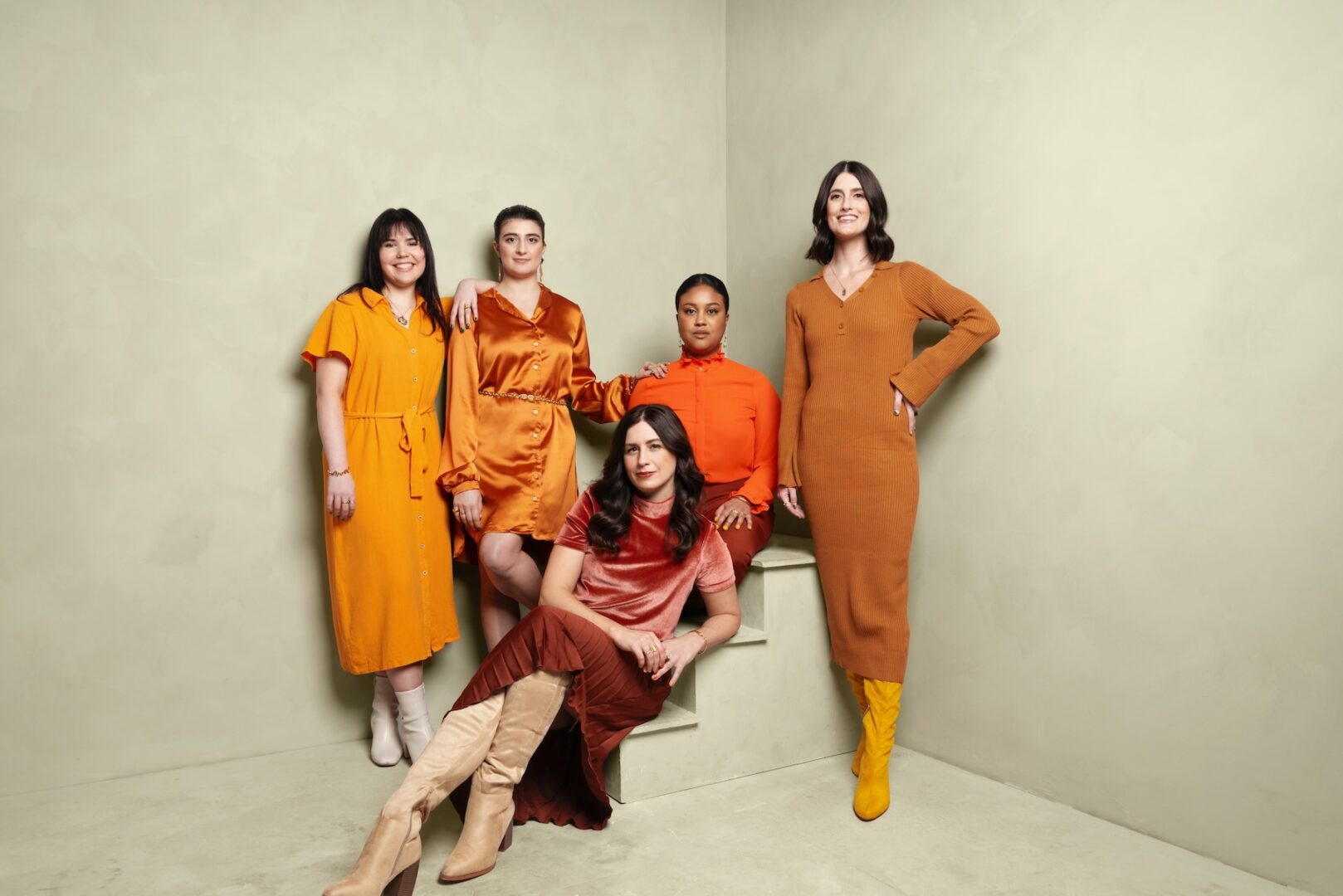We recently had the chance to connect with Amy Jacobus and have shared our conversation below.
Amy, it’s always a pleasure to learn from you and your journey. Let’s start with a bit of a warmup: What is something outside of work that is bringing you joy lately?
I have a deep love of horror films—I’m fascinated by how the genre builds and releases suspense, the bizarre physicality, and especially how meta many of them are. Horror films love to reference other films and comment on their own tropes. They’re so self-aware! Recently, a friend and I have been planning movie dates for every new scary release… Whether we’re enjoying 90s nostalgia or diving into some new weird world, I love that we’ve created this ritual of escape together.
Can you briefly introduce yourself and share what makes you or your brand unique?
Hi there! I’m Amy Jacobus, founder and lead marketing strategist at Grounded Growth Marketing. We help mission-driven nonprofits and creative entrepreneurs build marketing strategies that actually feel good.
My approach to marketing comes from a unique blend of backgrounds: I’m a former dancer who brings artful rigor to strategy, and my journalism training means I’m endlessly curious about not just what my clients want to achieve, but why they do what they do. This combination helps me dig deeper than surface-level goals to understand the authentic strengths and motivations that should drive every marketing decision.
What makes Grounded Growth Marketing special is our philosophy that marketing shouldn’t leave a sour taste in your mouth. Too many creatives and nonprofits find themselves in “do all the things” mode, frantically trying every tactic without seeing real results. Instead, I help clients step back from the panic button, take a full-body breath, and refresh their approach with marketing that’s grounded in purpose and humanity.
I excel at turning big, lofty goals into actionable steps—something my clients desperately need when they’re overwhelmed and under-resourced. Over the years, I’ve worked with incredible organizations like Jacob’s Pillow, 92NY’s Dance Education Laboratory, Liz Lerman, and more, directing everything from complete brand overhauls to ongoing email and social media marketing.
We design systems for long-term growth rather than quick fixes, because when your marketing is grounded in meaning, your growth has meaning too.
When I’m not strategizing, you can find me obsessing over John Mayer guitar solos, perfecting hand-drawn nail art, or enjoying fresh snowfall with my dog Edison.
Okay, so here’s a deep one: Who saw you clearly before you could see yourself?
I was hanging out with a friend from high school a few years ago, and he said to me “you were the first feminist I knew.” I probably blushed I felt so honored by this observation — that a young Amy was already standing up for women and searching for equality in things like English Lit class.
His observation made me realize something crucial about how I approach client work today. Even as a teenager, I was the one asking “How is this fair?” and “Are we looking at this through just one lens?”
I was constantly dissecting viewpoints or questioning authority (as respectfully as possible when you’re 16-17 years old). Always a straight A student, I remember getting a C on a sophomore English paper for arguing that Hemingway was misogynist—not because my argument was weak, but because the teacher disagreed with my stance. (How? I have no idea.) I was furious, but it taught me that while challenging authority isn’t always comfortable, I’ll still be glad I did if I believe I’m coming from a place of integrity.
While some of this points to a deep rooted values system that was guiding my decisions (and outbursts), it also points to a lifelong quest to think critically about everything presented to me. I tend to look up multiple sources when I learn something surprising, ask lots of follow up questions when I want to understand something better, and sit and overthink before speaking up with an opinion or suggestion.
This critical thinking skill is exactly what helps me ask the breakthrough questions in strategy sessions with clients. “That’s a great question” is something I hear constantly—because I’m trained to dig into assumptions that everyone else takes for granted. Things that make you pause and reflect. Things you might not know the answer to, but suddenly want to work to figure out.
It’s a gift that’s one part curiosity, one part skepticism, and I’m very grateful to have it.
What’s something you changed your mind about after failing hard?
When I first started freelancing, my business card listed everything I *could* do—a mile-long list of services. While technically true, it quickly became an overwhelming burden.
I was spending hours on mind-numbing tasks that felt completely unimpactful. Worse, I was constantly context-switching between wildly different types of work. A logo design project, then email copywriting, then social media management, then web development. I was exhausted and cranky, and my clients weren’t getting my best work.
When I started saying no to work I didn’t enjoy, some clients were disappointed. But the more I followed my intuition toward strategic work, the more doors opened in exactly the right direction.
Now when someone asks if we could “also do [blank]” during project discussions, I often say “We could, but we won’t, and here’s why…” That clarity has become one of our biggest differentiators.
This is why our marketing strategy sessions also focus on what you should STOP doing. Most marketing consultants want to add more tactics. We help you subtract the wrong ones so the right ones can actually work.
Next, maybe we can discuss some of your foundational philosophies and views? What are the biggest lies your industry tells itself?
The biggest lie? That “more is more.”
People without marketing experience who suddenly need to promote their work fall into this trap constantly. They think they need to be everywhere—posting unique content on Instagram, LinkedIn, and TikTok daily. They launch major rebranding projects before they’re comfortable operating their business, convinced they need to look professional before they can be seen as professional.
But being more places, showing up more frequently, and switching topics actually distracts you from the real work: delivering on your promise to clients and constituents.
I recently started following this Instagram account of a guy in his twenties renovating his back patio with his puppy “supervising” as the contractor. It’s near-daily videos following the exact same format, and it’s absolutely delightful. What strikes me is how quickly he’s built a devoted fanbase by doing the same thing over and over.
There’s something comforting about ritual and routine. While many people think repetition is a crucial marketing error, it’s actually a feature, not a bug. Consistency beats variety every time—but the vast opportunity of platforms and tactics out there sells the exhausting lie that you need to be everywhere, all the time, with something completely new to say.
This is exactly why our signature approach includes a robust assessment of your current marketing—we identify the tactics that will actually move the needle for your specific situation, then build sustainable systems around those. Often, this means creating a system around your marketing tasks to simplify and streamline what you’re doing and where you’re showing up. Instead of posting randomly across 3 platforms, we might advise you to focus primarily on email and adapt those topics to LinkedIn with a consistent weekly rhythm. The clearer focus saves you from the exhaustion of being everywhere at once, and it helps your audience better grasp what you should be known for.
Okay, we’ve made it essentially to the end. One last question before you go. What do you understand deeply that most people don’t?
Even the smartest business owners and nonprofit leaders can be seduced by the tools instead of focusing on the fundamentals.
Everyone obsesses over the latest AI writing assistant, the newest social platform, or the most sophisticated automations or CRMs. I see incredibly intelligent leaders spending hours wondering how to “be on TikTok,” even when their core audience isn’t using that platform.
It’s like renovating your kitchen when your foundation is cracking.
The fundamentals—knowing your audience deeply, crafting clear messaging, building genuine relationships, delivering consistent value—these haven’t changed. But they’re not flashy or new or fun. They also take time. These are not quick fixes; they are long-term plays.
We have a new client right now that wants to sell more of their virtual professional development courses, but they haven’t yet considered if those programs are the right fit for their current (and desired) audience. We’re about to dig deeper with them, surveying their past clients about why they hired them, researching their competitors’ products and services, and connecting the dots between these entry-level products and high-cost consulting services. The insights will change more than their marketing—they’re likely to also dictate product design.
I see it all the time. Smart people are solving the wrong problems first. They’re searching for tactics before they understand strategy.
Contact Info:
- Website: https://groundedgrowth.marketing
- Instagram: https://instagram.com/groundedgrowth.marketing
- Linkedin: https://linkedin.com/in/amynjacobus




Image Credits
photos by Studio 5800
so if you or someone you know deserves recognition please let us know here.




